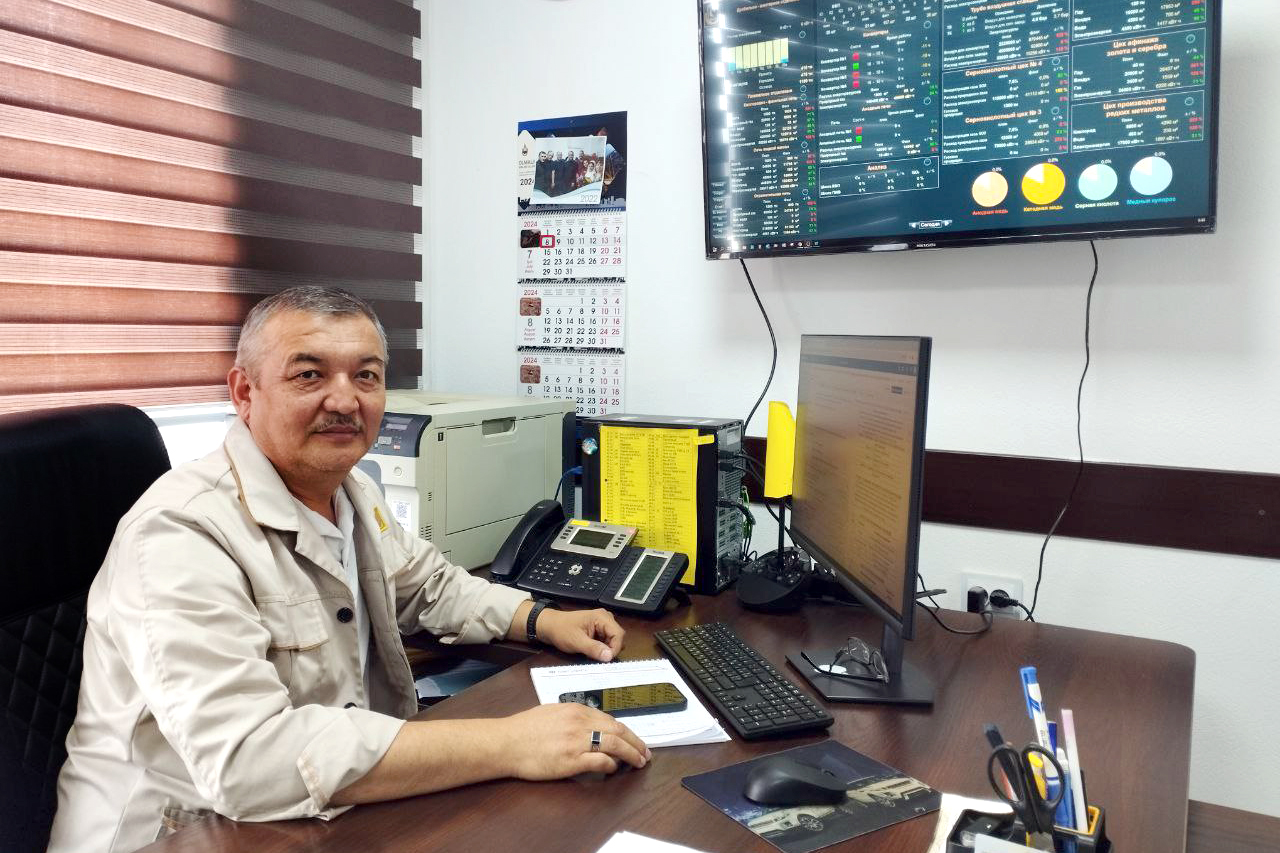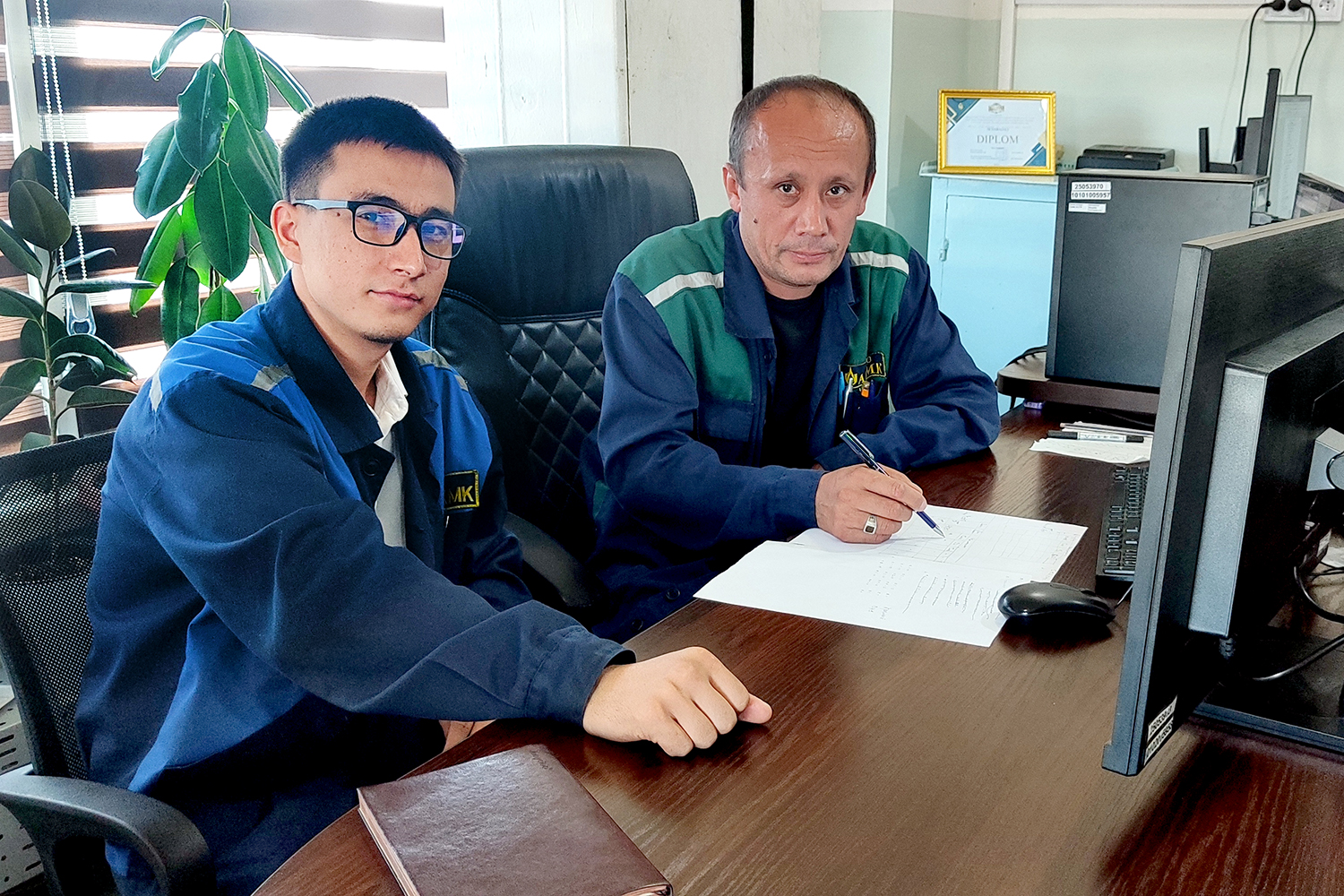-
Call-center
+998 78 141 90 99 -
Helpline
+998 71 619 23 33
Safety, efficiency, economy
A lot of work is being done in the divisions of Almalyk MMC JSC to implement the Digital AMMC-2030 Concept, developed in accordance with the Decree of the President of the Republic of Uzbekistan "On approval of the Digital Uzbekistan-2030 Strategy and measures for its effective implementation" dated October 5, 2020. And the copper smelter is no exception. In particular, last year, an automated operational dispatch control system (ASODC) was launched here in pilot mode. Its idea, algorithm and development are largely the merit of the head of the automated process control service of the Copper-Smelting Plant Bakhriddin TULYAGANOV, whom we asked to tell about this innovation.
- The automated system of operational dispatch control has a number of advantages. This is operational control of the parameters and modes of technological and production processes; monitoring the state of technological equipment; control of emergency situations, taking measures to prevent and eliminate violations; logging events, maintaining data archives; ensuring dispatch control and accounting of fuel and energy resources; ensuring analysis of work and transmission of information in online mode, etc.; presentation of current information in real time in a form convenient for the operator (visualization); reporting of raw materials and energy resources in digital automatic mode.
Dispatch control helps to ensure rational operation and use of all units, takes into account the operating time, idle runs, downtime, shift and daily control and accounting of all energy resources (natural gas, oxygen, electricity), etc. It is worth noting that the use of energy resources can be viewed both in numbers (cubic meters, tons) and as a percentage relative to the forecast data. All indicators and parameters are archived, so that they can be used as needed. And all this can be done in literally a couple of clicks of the computer mouse. In addition, the system itself gives "hints": operating equipment is marked in green, idle or under repair - in red. Thus, everything is taken into account for instant analysis and prompt decision-making. In addition, shift foremen of the shops keep their journals in electronic form. For this purpose, computers for data transmission and process control have been installed in almost all business trips and at the workplaces of engineering and technical workers of the plant's shops and divisions.
As practice has shown, the ASODC is a very convenient tool that allows monitoring what is being done at the plant.
The mnemonic diagram developed by the specialists of the plant's APCS service almost completely reflects the process of the metallurgy plant. In the metallurgical shop, this is the reception of the charge in the crushing and charge department, supplying it to three smelting units (PZhV, KFP and reflective furnaces), the operation and condition of the converters, monitoring the transportation of exhaust gases to the sulfuric acid shop, loading anodes to the copper electrolysis shop... The SCC fully visualizes the process of gas utilization, daily production of sulfuric acid. In the air separation shop, the operation of all units, production of technical oxygen, compressed air are “visible”... In the rare metals production shop and the copper sulfate shop, the operation of key units, their current status (in operation or in reserve or under repair), the release of finished products, all necessary reports are also visualized...
This work has not yet affected our "closed" workshops - the Central Electromechanical Plant and the Central Automation and Control Center. The plans include the implementation of the automated process control system in the gold and silver refining workshop next year.
In addition, software has been implemented in the department of the central analytical laboratory located on the territory of the MPZ, which records all types of chemical and express analyses.
The operation of the automated process control system has improved control over the plant's technological process by up to 80%, helped save up to 40% of working time (if previously a telephone was used to transmit data or "messengers" were sent with the necessary information, now this is not required), and increased the safety of process control by 10%. Thanks to the use of the system, it was possible to save electricity in the amount of more than 640 million soums per year due to the reduction of equipment idle runs.
All MPZ workers who use the automated process control system have already appreciated its convenience, efficiency, safety, and cost-effectiveness.
This painstaking work was carried out by the plant's automated process control service. I would like to note that we have a friendly, close-knit team, and the atmosphere of mutual understanding and support reigns in the team. Leading programmers Zhasur Matkarimov, Ruslan Abduzhamalov, programmer Farrukh Raimkulov, instrumentation and automation adjusters Abduvahob Abduganiyev, Abdunabi Akhmedov, foremen Ravil Shaibekov, Aziz Yulchiev, Shukhrat Berdiev, head of the instrumentation and automation shop Umid Azizov and others took part in the development of the software.
There is still much to do. It is necessary to complete the mnemonic diagram and develop a system for transmitting information and data to the central control room of the AMMC. By the end of the year, we plan to launch a training stand for managing the technological process of the MPZ to train newcomers, acquire professional skills, and practice eliminating emergency situations. In addition, this stand will be used to improve the skills of programmers, conduct experiments to optimize the management of technological processes. And the head of the instrumentation and automation shop U. Azizov takes an active part in the design of the facilities of the new metallurgical complex in terms of instrumentation and automation and automated process control systems.



